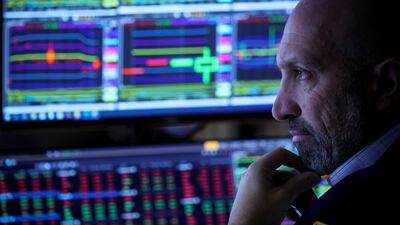Crude prices rose on Friday but were on track to record their third consecutive weekly loss over Chinese demand concerns and Russian price cap talks.
Brent, the benchmark for two thirds of the world’s oil, was 1.5 per cent higher at $86.63 a barrel at 3.04pm UAE time. West Texas Intermediate, the gauge that tracks US crude, was up 2.1 per cent at $79.57.
“Oil markets remain bound to the cut and thrust of EU negotiations over the Russian oil price cap,” said Daniel Richards, Middle East and North Africa economist at Emirates NBD.
The Group of Seven advanced economies (G7) is ready to impose a price cap on Russian oil from December 5. The goal is to keep Russian barrels in the market without allowing Moscow to reap the benefits of high prices.
European Union diplomats say they need more time before resuming negotiations to cap the price of Russian oil, 24 hours after failing to agree on the $65-$70 a barrel ceiling suggested by the G7.
“As the decision on what level to apply needs to be unanimous, talks have been extended to bridge the gap between those that favour a harder line on Russia and those that are more accommodative,” Mr Richards said.
A high price cap would probably keep oil supplies uninterrupted because it would mean prices close to what Russia is already receiving.
Brent crude closed in on a record high of nearly $140 a barrel after Russia started a military offensive in Ukraine in late February, but has since given up most of the gains amid concerns about slowing growth in China and the broader global economy.
A resurgence of infections in China, the world’s second-largest economy, has dashed investor hopes of an easing in the country’s zero-Covid policy, which has dampened the short-term growth outlook.
China reported 32,695 new cases on Thursday, of which 3,041 were symptomatic and 29,654 were asymptomatic, up from 31,444 a day earlier, according to the National Health Commission.
"Lockdowns in all but name appear to be popping up in major Chinese cities in an attempt to get a grip on record cases, which will weigh heavily on economic activity once more and in turn demand," said Craig Erlam, senior market analyst at Oanda.
"It's now a question of how long they last, but clearly investors' enthusiasm [for] the relaxation of Covid restrictions was a bit premature."
Prices fell by about $5 on Monday after the Wall Street Journal reported that top crude exporter Saudi Arabia was considering raising output targets by 500,000 barrels per day at the next Opec+ meeting.
Crude futures rebounded after Saudi Energy Minister Prince Abdulaziz bin Salman said the current output cut would continue until the end of 2023.
Opec+, an alliance of 23 oil-producing countries, has slashed its collective output by two million bpd amid worsening signs of a global economic slowdown.
Prince Abdulaziz held talks with Iraq's oil minister Hayan Al Swad on Thursday and stressed the importance of adhering to the Opec+ cuts until the end of next year, the Saudi Press Agency (SPA) reported on Friday.
The two sides reviewed developments in the oil markets and pointed to "the ability to take further measures, if required, to achieve balance and stability in the market", according to SPA.
Opec+ will meet next on December 4, a day before the G7’s price cap and an EU embargo on Russian crude exports are scheduled to come into effect.
“I'm not sure what the motive would be at this point but perhaps it's heavily conditional on the outcome of the G7 talks,” said Edward Moya, senior market analyst at Oanda.
The EU embargoes on Russian crude oil and refined petroleum products will lead to a "further reallocation" of trade, according to the International Energy Agency (IEA).
An additional 1.1 million bpd of crude oil and one million bpd of oil products currently going to EU countries will have to find new homes, the IEA said in a recent report.

